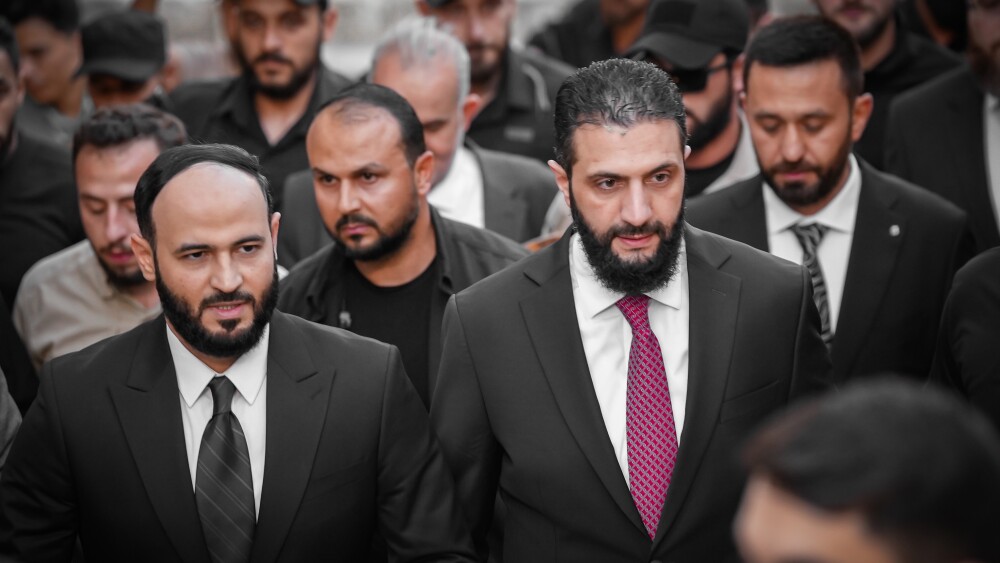On August 8, 2025, a conference in Hasakah, northeastern Syria, championed everything the interim Syrian government opposes. Organized by the Autonomous Administration of North and East Syria, the meeting called for a new democratic constitution that guarantees rights of all ethnic and religious groups in a pluralistic, decentralized Syria.
The gathering angered Damascus so much that it announced it will not participate in an upcoming meeting between the Syrian government and the Kurdish-led Syrian Democratic Forces (SDF), which had been expected to take place in Paris in the next few weeks.
Although promoted under the banner of “Unity of Components” in northeast Syria, Syrians saw the conference as a national dialogue, particularly given the virtual participation of prominent figures from western and southern Syria. It was the participation of the Druze spiritual leader Hikmat al-Hijri and Alawite sheikh Ghazal Ghazal—both key opponents of President Ahmed al-Shara’s government—that infuriated supporters of the new regime.
The interim authorities have grown increasingly authoritarian, sectarian, and centralized, alienating other political and social forces across the country.
In February, al-Sharaa convened a national dialogue conference in Damascus that only nominally included participants from across the country. In practice, attendees were al-Sharaa loyalists. The gathering failed to address the real issues facing Syria during the transition and served solely as a tool to legitimize al-Sharaa’s rule. A subsequent temporary constitution granted excessive powers to the president with little commitment to reform, democratic freedoms, and inclusivity.
Since then, the interim authorities have grown increasingly authoritarian, sectarian, and centralized, alienating other political and social forces across the country. Large-scale violent attacks against the Druze and Alawites have reinforced fears about al-Sharaa’s style of leadership.
Even those who do not necessarily support the Kurds or the Syrian Democratic Forces backed the Hasakah conference as a parallel national dialogue. Since al-Sharaa and Hay’at Tahrir al-Sham rose to power in December 2024, Kurdish groups have embodied a liberal alternative to extremism. Druze, Christian, and Alawite communities, and many moderate Sunni Arabs see the difference between the Kurds’ vision and al-Sharaa’s moves toward Islamist dictatorship in increasingly stark terms.
Damascus fears that this Kurdish-led move could undermine the façade of legitimacy it has built over the past eight months. It responded by arguing that the Syrian Democratic Forces violated their previous agreements with al-Sharaa, even though the principles adopted at the Hasakah conference do not contradict the March 10 agreement between Damascus and the Syrian Democratic Forces, particularly those concerning Syria’s territorial integrity.
While a military confrontation with the Syrian Democratic Forces may not be politically and militarily feasible, the Sharaa government has already incited its rogue armed groups—particularly those affiliated with Turkey—to clash with Kurdish-led forces.
In the meantime, pro-government pundits have launched a smear campaign against conference attendees, branding them as separatist and traitors.
The Hasakah conference and its outcomes present the Syrian government with a window of opportunity to take positive action toward all communities.
The Turkish government, which views the Syrian Democratic Forces and other Kurdish entities as terrorist extensions of the Kurdistan Workers’ Party (PKK), has not commented on the conference, though pro-government Turkish media have echoed the Syrian government’s stance on the issue. For Ankara, the Syrian Democratic Forces’ calls for a democratic and pluralistic Syria represent a nationwide platform for a group whose influence Turkey wants to keep confined to northeast Syria. The threat of using force against the Syrian Democratic Forces in northeast Syria remains present, though actual military action now depends on the progress of Turkey’s own peace process with the PKK.
The Hasakah conference and its outcomes present the Syrian government with a window of opportunity to take positive action toward all communities, engage and demonstrate commitment to inclusive governance and reconciliation. But if al-Sharaa continues to reject genuine dialogue on inclusion and pluralism, Syria could face a Libya-like scenario, with two governments—one in Damascus and one in the northeast—competing for domestic and international legitimacy.
While the Sharaa government has secured significant international backing, the recent waves of violence against the Druze and Alawites have fueled skepticism within the international community about al-Sharaa’s ability and willingness to safeguard the country’s civil peace.








